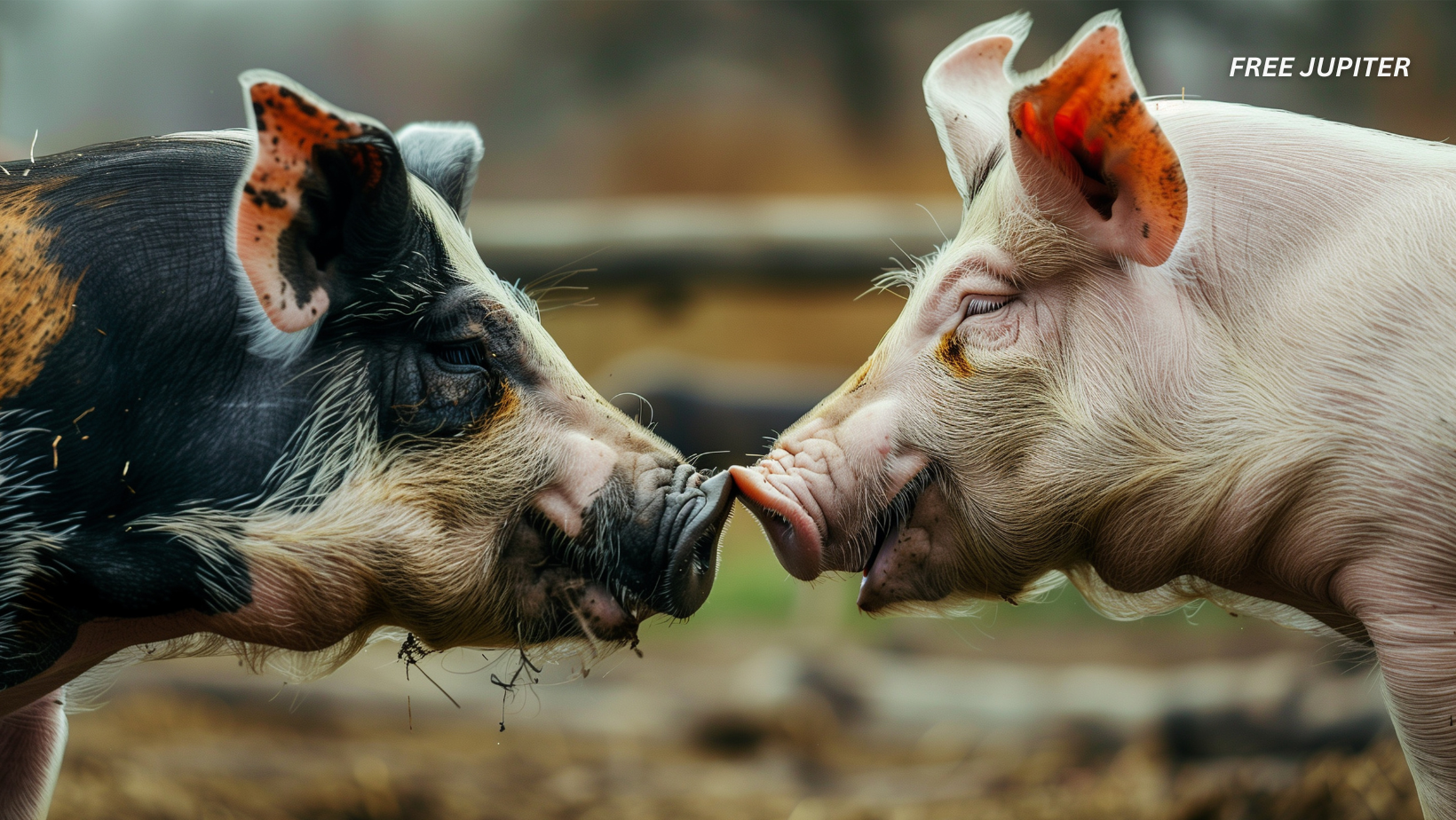Friendly Note: FreeJupiter.com shares general info for curious minds 🌟 Please fact-check all claims—and always check health matters with a professional 💙
When it comes to clever creatures, most of us think of the usual suspects—dogs, dolphins, chimpanzees. Maybe even parrots, elephants, or crows. But there’s one animal that rarely gets the spotlight, even though it probably deserves a standing ovation: the humble pig.
Yes, pigs. Those muddy, curly-tailed animals we often associate with farms and fairy tales have brains that would impress even the most seasoned animal behaviorist. In fact, scientists now say pigs may be smarter than dogs—and even outshine young children in certain mental tests.
Let’s dig into the surprisingly sophisticated world of pig intelligence.
Memory Like a Map: Pigs Remember and Navigate With Ease
A study from Emory University and other researchers has shown that pigs possess incredible long-term and spatial memory. They can recall where objects are located, even after long periods of time. This isn’t just simple remembering—it’s the kind of memory that helps you mentally map out your surroundings.
In one experiment, pigs were placed in a maze with food rewards hidden throughout. Not only were they able to find the food, they remembered the layout of the maze in future attempts, adjusting their behavior based on prior experiences. That means pigs can learn from trial and error, much like humans do when solving a complex problem.
Unlike animals that rely purely on instinct, pigs show they can analyze a situation, store information, and use it later. That’s an important indicator of intelligence—and it’s something only a few species do well.
Read more:The Reason Cats Prefer Sleeping on Their Left Side, According to Science
Masters of Problem-Solving: Not Just Smart, But Strategic
Beyond remembering locations, pigs are excellent problem solvers. In various cognitive tests, pigs have been taught to use joysticks to control cursors on computer screens—tasks that require an understanding of cause and effect, as well as physical coordination. And they figured it out faster than some primates.
They’ve also demonstrated the ability to learn complex chains of behavior to get a reward—like pushing a lever, turning a knob, and opening a door—all in the correct order. This sort of step-by-step thinking is incredibly advanced and shows a capacity for both learning and reasoning.
Even more impressive? Pigs seem to enjoy learning, showing enthusiasm when presented with new challenges. Their curiosity and persistence often rival that of dogs or chimpanzees in lab settings.
Emotional Depth: They Feel, Relate, and Empathize
But being intelligent isn’t just about logic and memory. Emotional intelligence—the ability to recognize, respond to, and even share in the emotions of others—is a crucial part of what makes an animal truly smart.
Studies show that pigs experience a wide range of emotions. They feel joy, frustration, anxiety, and even excitement. When kept in stimulating, social environments, pigs have been observed playing games with one another, snuggling for comfort, and even grieving lost companions.
Even more fascinating is their capacity for empathy. In one study, pigs were able to sense distress in their peers and changed their behavior in response, sometimes offering physical comfort or avoiding actions that caused others discomfort. That kind of emotional awareness is extremely rare in the animal kingdom and suggests pigs are much more socially sensitive than most people think.
Mirror, Mirror: Pigs Recognize Themselves (Faster Than Some Toddlers)
One of the most famous tools for measuring animal intelligence is the mirror test—a way to see if an animal can recognize its own reflection as itself, rather than mistaking it for another animal. This test is typically passed by only a few species: great apes, dolphins, elephants, magpies, and now… pigs.
In experiments, young pigs (called piglets) were placed in front of mirrors. Within just a few hours, they figured out that the reflection was their own. They used this realization to locate food hidden behind barriers, relying on the mirror to guide their actions. This ability—self-recognition—is considered a strong marker of advanced cognitive function.
To put this into perspective, human children usually don’t pass the mirror test until about two years of age. Piglets, meanwhile, caught on in a single afternoon.
Read more: Biologists Say That The Sun May Be A Conscious Being
Top of the Class: Where Do Pigs Rank in Animal Intelligence?
So just how smart are pigs compared to the rest of the animal kingdom?
Researchers have ranked pigs among the top five most intelligent animals on the planet. That’s alongside dolphins, elephants, chimpanzees, and crows. Dogs, despite their emotional intelligence and bond with humans, usually fall a bit lower on the list.
Pigs beat dogs in multiple categories: problem-solving, memory, adaptability, and even emotional range. While dogs are beloved for their loyalty and social skills, pigs tend to perform better in scientific tests that require reasoning and analysis.
Why Don’t We See Pigs as Brainy Beings?
Despite their impressive mental capabilities, pigs are often left out of the “smart animal” conversation. Why?
One reason could be cultural bias. Pigs are usually raised as livestock and rarely kept as pets (at least outside of the occasional teacup pig). Because we don’t interact with them in the same way we do dogs or cats, we don’t get to see their intelligence firsthand.
Another reason might be that their intelligence has been underestimated or ignored due to their role in agriculture. But as more research emerges, animal behaviorists and scientists are urging people to reconsider how we view pigs—not just as livestock, but as deeply complex and emotionally rich creatures.
What This Means for the Future
The more we learn about pigs, the harder it becomes to ignore how incredibly smart they are. They can solve puzzles, understand emotions, remember details, recognize themselves, and adapt to new challenges. They don’t just respond to their environment—they interact with it thoughtfully.
This growing body of evidence is sparking deeper ethical conversations about how pigs are treated. Some researchers believe that their intelligence should be a factor in how they’re raised, handled, and protected. If we wouldn’t treat a dog or a chimpanzee a certain way, should we treat pigs any differently?
Read more: New Bill to Ban Cat Declawing Advances in California—Full Ban One Step Closer
Final Thoughts: More Than Mud and Oinks
Pigs have long been associated with mud puddles and farmyards, but science is rewriting that story. Far from being dirty or dull, pigs are proving themselves to be some of the most intelligent, emotionally sensitive animals on Earth.
They learn quickly, think deeply, remember vividly, and care genuinely.
So the next time someone uses the word “pig” as an insult, you might want to take it as a compliment.










